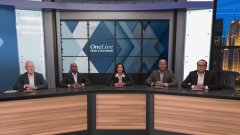
Unmet Needs in Early-Stage HR+/HER2- Breast Cancer
Experts on HR+/HER2- breast cancer discuss unmet needs in the early-stage setting.
Episodes in this series

Transcript:
Komal Jhaveri, MD, FACP: [There has been] certainly a big leap of progress. We’ve changed our treatment paradigms. We have many things we can try and do, using chemotherapy with genomic profiling. What do you think are the unmet needs, then, at this point for early stage?
VK Gadi, MD, PhD: I want to be cautious and say we don’t have all the tools we need. We can always benefit from drug development, safer drugs, etc. So that’s an easy answer. More drugs are good. But, really, I think we are increasingly moving into a space where the art of precision medicine is driven by the biomarkers. We need to know the patients, not just based on stage and other criteria to optimize, as Tim was talking about. It’d be great to have tools that say this patient’s truly at much higher risk than this other one, based on a molecular feature, maybe ctDNA [circulating tumor DNA], something like that. I think we need to flush out the development of those markers to be precise, because when these tools are approved, initially, it’s for everybody, so to speak. Yet we know most of the patients don’t need it [and] don’t benefit [from it]. So, this is, I think, the heart of the matter. That’s the biggest unmet need I personally see moving forward.
Komal Jhaveri, MD, FACP: Tim, any other thoughts on unmet needs that you have been thinking about?
Timothy Pluard, MD: Well, certainly with adjuvant endocrine therapy, toxicity is a big issue, and the challenge is for women to try to stay on endocrine therapy despite some of the adverse effects that they might experience. It might impact the quality of their life. So agents that might be more effective but also more tolerable would be ideal in the drug development world.
Komal Jhaveri, MD, FACP: [Gregory,]I’ll turn to you. Anything else that you think?
Gregory Vidal, MD, PhD: Yes, I do. Just from a disparity perspective and for underrepresentation perspective. I think there is a big need for understanding how these drugs that we use are impacting one population vs the next. We have the RxPONDER [trial] data [NCT01272037], where all the patients in the study supposedly got the same treatment in the sterile environment, yet the Black patients did worse. Why? We don’t quite understand that, but that’s something that we need to understand because there is a population that is not doing as well as they should be.
Komal Jhaveri, MD, FACP: That is such an important point that you bring up. I think the FDA has set out criteria now to expand the eligibility criteria. That is definitely a big ask to try to address this so that we can enroll patients which are diverse ethnicity groups, so that we can understand the biology and offer these drugs to everyone, and access is available to all of them. It is such an important unmet need. Aditya, anything from your perspective that you think is really important to address at this point?
Aditya Bardia, MD, MPH: I think we covered the key elements in terms of the patient population and biomarkers. One thing I would say about biomarkers is we also need dynamic biomarkers. We have Oncotype DX, MammaPrint, but that’s looking at the genomic profile at baseline. But [with] endocrine therapy, we continue for 5, sometimes 10 years, and we need better ways of monitoring that and guiding who needs 5, who needs 10, not looking at the original specimen, but at the end of 5 years, assessing biology, like by ctDNA to decide who needs longer therapy vs who does not.
Komal Jhaveri, MD, FACP: Is there a particular genomic profiling assay that you use in your clinic more than the others?
Aditya Bardia, MD, MPH: There’s increasing interest in the Signatera assay, which is a circulating tumor DNA assay that was recently approved by Medicare, and it can help monitor the presence of circulating tumor DNA in high-risk patients. So, stage IIB and stage III disease. The bigger challenge is, if you do find something, what do you do with that information? I think we need clinical trials to address that. I think it’s the first step.
Komal Jhaveri, MD, FACP: Thank you for sharing that.
Transcript edited for clarity.
Clinicians referring a patient to MSK can do so by visiting msk.org/refer, emailing referapatient@mskcc.org, or by calling 833-315-2722.





































